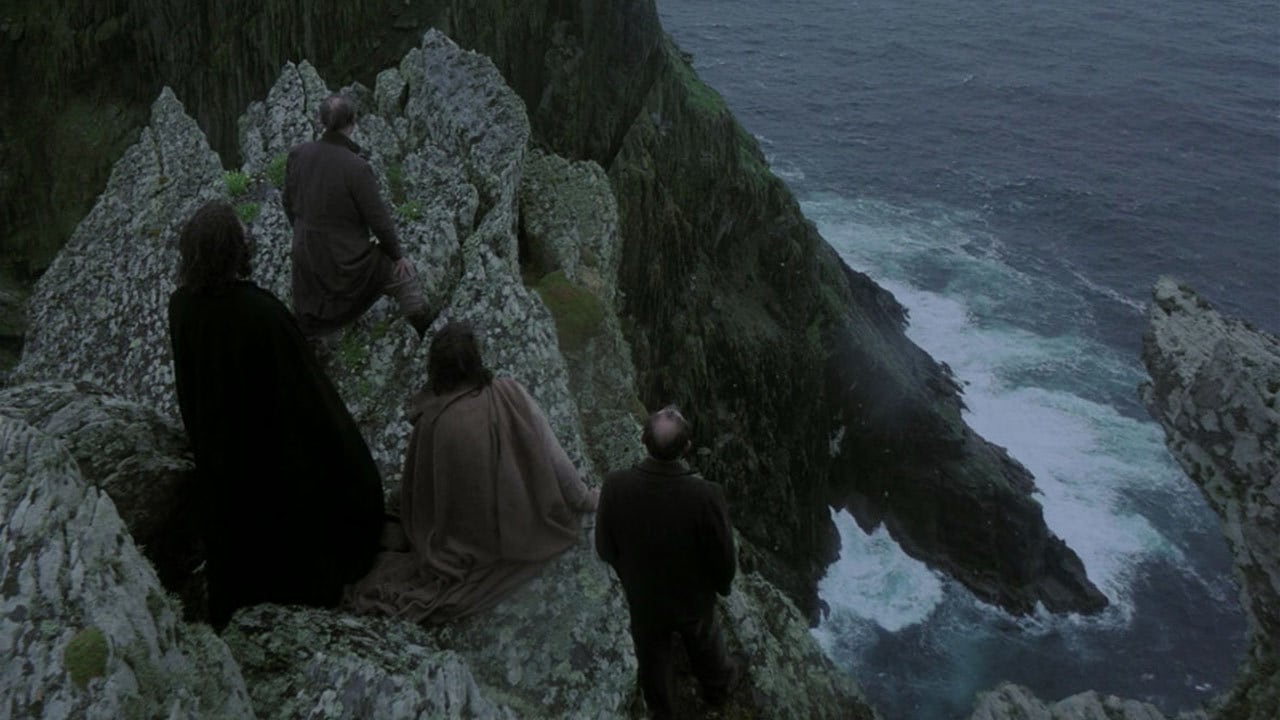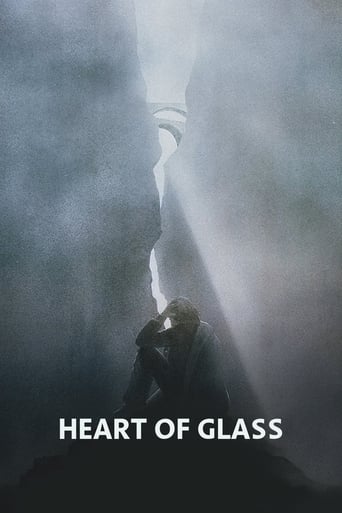

In 18th century rural Bavaria, a renowned glassblower dies, taking the secret of his popular ruby glass to his grave. The young master of the glass works is the de facto ruler of the village on account of the work his factory provides the locals, he obsessively seeks the answer to the mystery of the ruby glass.When I first saw this movie, I had literally no idea that the vast majority of the cast had been hypnotised by director Werner Herzog before shooting their scenes. It's one of these situations which is common with Herzog, where knowing about what he was doing behind the scenes is instrumental in appreciating the film itself. The dazed performances of the cast are put into some kind of perspective with foresight that is for sure. I think one of the ideas behind the hypnosis was to illustrate that these characters are mindlessly following an impossible dream; one they can surely never achieve and one solely based on nothing beyond economics. Whatever the reason it is a wilfully bizarre idea and the results are, to say the least, peculiar. The film has a somewhat deliberate pace and it mixes in Herzog's distinctive mixture of documentary realism with stylised weirdness. Like some of his other oddball efforts such as Fata Morgana (1971), this one falls pretty clearly in avant-garde territory on account of the very strange acting performances. It is essentially a story about a community gone mad, with a shepherd prophet in the periphery predicting many things to come. As is the way though, like many other Herzog's there are moments of visual splendour like fantastic views of the mountains which are like scenes from 19th century romantic paintings come to life, while there are also some customary smaller scale moments of fascination such as the scene showing a glassblower make a small ornamental horse in a seemingly effortless fashion.Ultimately, this is another of those films which is clearly only going to appeal to a few people. Its sheers oddness will alienate a few and it is true that it does take a bit of effort to watch at times. But it is another that highlights the highly original mind of Herzog and the way he has furrowed his own distinct path, this is probably one of his most unusual.
... View More"Herz aus Glas" or "Heart of Glass" is an award-winning (German Film Award) 95-minute movie from 1976, which means it has its 40th anniversary this year. The writer and director is Werner Herzog and this is why this film is among the most known works from 1970's West Germany. The lead actor here is Josef Bierbichler (in his 20s) who is still acting successfully these days in German film and worked with Herzog on other occasions too ("Woyzeck"). And while I like Bierbichler and think he has great physical presence in his films (similarly to Mario Adorf), I must say that his film here did very little to me. This surprised me as I am usually a big Herzog fan. But to me, this felt more like a Schlöndorff movie perhaps. Yes, these almost 100 minutes are full of beautiful shots as always with Herzog and also some nice metaphors, but somehow I would have expected a Herzog film on ruby glass to be a lot more memorable. The action was very slow and I felt it was difficult to really get interested in the characters or the story in general. For me, this was definitely one of the worst Herzog films I have seen. I cannot recommend the watch here and I have zero interest to ever see it again. Thumbs down.
... View MoreThere is a scene near the beginning in which two men in peasant dress appropriate to a period around 1800 are sitting across a small table from each other in a silent ale house. One of the men looks a bit like Richard Boone; the other like a guy who runs a pawn shop. They stare at one another sullenly. Boone finally says, "I'll dance on your corpse." Time passes. Enough time for glaciers to advance and retreat. "No, you won't," says the pawn shop guy. Dynasties rise and fall. Boone picks up his beer glass and wordlessly smashes it over the other man's head. The Mesolithic Age comes and goes. The pawn shop guy, as if playing Laurel to Boone's Hardy, deliberately picks up his glass and empties it over Boone's head. The end. That's the whole scene.The story, to the extent that there is one, is about a one-factory village whose foreman has just died and been buried. He was the only man in town who knew the secret of making ruby red glass in the factory. The owner of the factory is despondent. Or maybe not. It's hard to tell because everybody seems beset with melancholy. At least those who can express any emotion at all. It's been claimed that the entire cast was under hypnosis during filming. I don't believe it, but I can believe Werner Herzog slipped some sort of synapse-fusing psychedelic substance into their beer steins and bratwurst because there seems to be an abundance of schizophrenic non sequiturs on display. At times it looks like the scenes in the "loony bin" in Val Lewton's "Bedlam." I understand some German but, aside from the factory owner, this was one weird dialect. I won't go on with this because there's either too little to go on or way too much.The production design is exquisite and so is the lighting and the photography, both indoors and outdoors. Everything looks slightly blue, icy, and damp under the remorseless clouds but it's all beautifully done. The compositions are flawless. Herzog has the eye of an old-fashioned painter, somebody on the order of Rembrandt.There is no musical score except source music played on period instruments -- something that resembles a harp and another that looks like a miniature concertina.There isn't much to say about the film except that it's just about the opposite of what you'd find in a ten-second television commercial. No noise, little action, lengthy static shots, and no attempt to sell any discernible message at all.In a way, the movie resembles Werner Herzog himself. If you haven't seen him interviewed, you really should. He's calm and self possessed. His accent is soothing, enthralling even. He doesn't laugh and doesn't show any expression of irritation. He's like a very very good shrink. Yet, what he says is sometimes insane. "Even the stars are crazy"?
... View MoreDirected by Werner Herzog, "Heart of Glass" is set in an 18th century Baravarian town. Here villagers go about their business like brainwashed zombies, everything they deem important a mere half-thought (re)action provoked by tradition, routine, religion and biology. Director Werner Herzog hypnotised his cast so as to engender this effect. As "Heart of Glass" progresses, it becomes clear that these villagers depend on a local glass factory. This factory provides them with money, work, meaning and purpose. But when the Master of the glass factory dies, the villagers are left confused. The Master which they have defined themselves in relation to, has been torn away. All meaning gone, the very framework of their lives destroyed, the villagers begin to panic and go insane. A deeply existential film, Herzog's factory thus becomes what psychoanalysts tend to call a Master Signifier; the order of Law and Language, an invisible framework or ordering force which fixes the field of all meaning. And as with all Master Signifies (church, religion, God, daddy, state, money, kings etc), as the Master has a constituent lack, and is it in a sense totally arbitrary, it can only guarantee its own importance through arbitrary and ungrounded violence. Worse still, to kowtow to this Signifier produces a certain psychosis. The Signifier orders reality and its subjects - who define themselves under its imagined gaze - but this ordering is entirely arbitrary.Unsurprisingly, Herzog treats glass as a divine object with a holy glow and an almost mystical power. The glass workers are blue collared clergymen, and their dead Master a papal figurehead whom they believe to possess mystical wisdom. "How do we make glass now that the Master is dead?" the villagers wonder. "Only the Master knows the secret formula," one mournfully says. The divine cocktail which allows the glass to flow has been lost. Without it there is only chaos. A darkness enters the village.Late in Herzog's film, a sad eyed woman plays with a glass cup, its holy glow washing across her face. She says it reminds her of a church...before she is startled and drops the glass cup to the floor. The holy object shatters upon impact. "There is more to break today," a voice sounds from behind her. It is a prophet called Hias, a local who lives in the wilderness and has visions, all of which eventually come to pass. The world is ending, Hias says, a line which echoes the apocalyptic ruminations of Herzog's "Lessons of Darkness" and "Encounters at the end of the World".Hias foretells a collapse of all meaning, of all moral frameworks, an existential collapse which will lead to widespread anxiety. The villagers refuse to believe this. Instead they come to him with tales of a demon giant which kills their animals and tears trees from their roots. But Hias brushes these tales aside. The realm of the supernatural is gone. The monster is merely an optical illusion, the giant a shadow of a lowly dwarf.The villagers can't fathom this. Like the cultic founders of some medieval religion, they decide that the Master must have hidden the formula somewhere in the village. And so they tear the town apart looking for "truth", for "order", for some quasi-religious scripture, until, in a mad frenzy, they sacrifice an innocent local girl, thinking that her blood holds the key to making the holy glass. When the blood ingredient proves futile, the villagers turn on Hias. He is a demon, they now believe, who has brought this cataclysm upon them! Hias is chased out of the village.The future of mankind's "soul" – perhaps also Herzog's - is now on the line. Hias thus goes off into the wilderness and is forced to confront an invisible bear. He wrestles this invisible, superstitious being, and eventually wins; man has beaten myth. And so in a kind of Nietzschean triumph, God is suddenly dead. With this comes the birth of the new Herzog and the new world. How to survive this new world? Asceticism, perhaps. Director as Ascetic, film as penance, as trial in the name of the God that is art. "Thou shalt lift boat above mountains in the name Celluloid," Herzog hears, the director flagellating himself for the new Lord of the screen. Maybe. Maybe not."Heart of Glass" then ends with its best sequence, a parable about Irish monks living on a remote rock in the middle of the ocean. The monks stand on this craggy rock, at the edge of the world, daring God to make himself known. Finally they set off on boats to test their beliefs: is the world flat, they wonder, and does it end in an abyss? Is man forever on the precipice, or is there hope out there in the beyond? We recall the final moments of Herzog's "The Enigma of Kaspar Hauser", and we weep.8.9/10 – Masterpiece. Multiple viewings required.
... View More